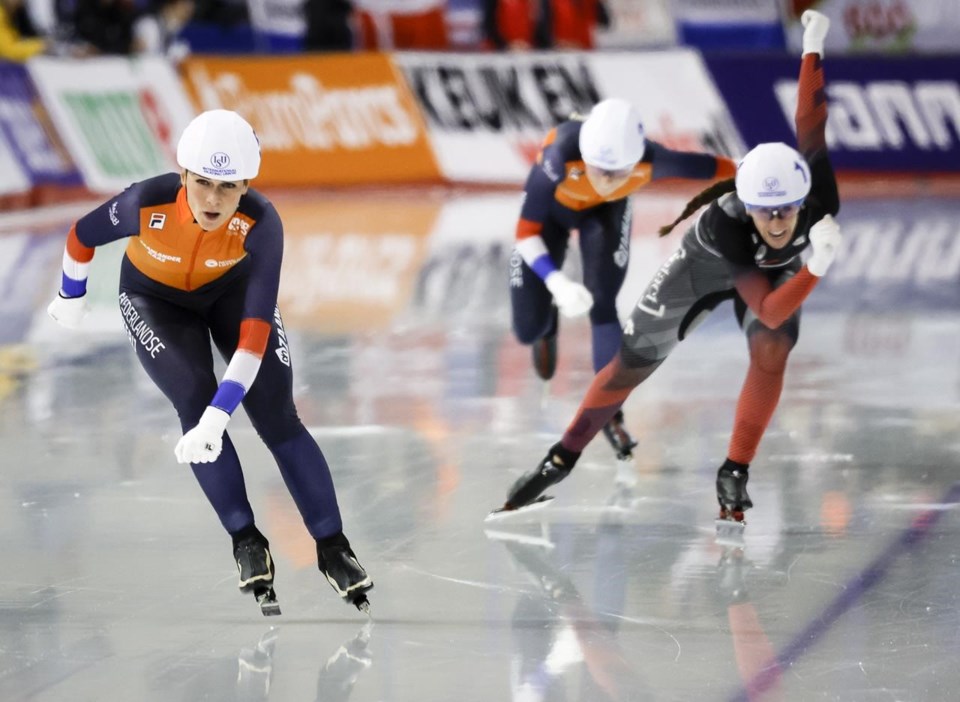CALGARY — Ivanie Blondin returned to the podium in her signature race, while Connor Howe and Hayden Mayeur took advantage of chaos on the final day of a speedskating World Cup in Calgary.
The Canadians produced three mass start medals Sunday.
Ottawa's Blondin was second among women and Howe of Canmore, Alta., and Toronto's Mayeur were second and third respectively in the men's race.
Blondin crossed the line behind Irene Schouten of the Netherlands, which mirrored the result of the women's mass start in February's Olympic Games in Beijing.
Blondin's silver Sunday was her third medal in as many days. She took bronze in the 5,000 and also helped Canada earn silver in the women's team sprint.
The mass start final was also her third race of the day after the 1,000 metres and a mass start semifinal.
"It's a lot, but I think I executed," Blondin said. "I'm exhausted right now and I'll need a little vacay after this.
"Schouten got a way from me in the final sprint, but there's only so much I can do with the legs that I've got, with a big day like that and a big weekend as well."
Sunday's mass starts concluded back-to-back speedskating World Cups in Calgary's Olympic Oval.
The mass start is 16 laps of 16 skaters racing each other instead of the clock, with intermediate sprints providing points.
Blondin, a two-time world champion, was disqualified a week earlier in her first race in Calgary for blocking other skaters.
A Â鶹ÊÓƵ Korean and Italian among the front-runners crashed on the final corner of a furious dash to the line in the men's race.
Howe and Mayeur held their blade edges and their nerve for the first mass start medals of their careers behind victor Bart Schouten of Belgium.
"It was really crazy," Howe said. "People everywhere and fast speed and then the last corner the two guys falling. You kind of have to put yourself in the right spot and then a bit of luck comes in, and speed."
Backgrounds in short track speedskating assist Blondin and Mayeur in deciding when to make moves in a pack.
"The mass start, you can't really make plans for it," Mayeur said. "Everything changes every half lap. There's a change in the lead, a change in the speed, people can fall.
"This is the first mass start where Connor and I were in the final together. We both ended up on just at the right spot on the right lap. Going into the corner there, there was definitely some instability in the field."
The Netherlands dominated six days of racing over two weekends in Calgary with nine gold medals and 22 overall.
The Canadian team produced 10 medals, including two gold.
Laurent Dubreuil of Lévis, Que., won the first men's 500 metres. Blondin, Valérie Maltais and Isabelle Weidemann took the women's team pursuit.
Jordan Stolz of the U.S. and Jutta Leerdam of the Netherlands won the men's and women's 1,000 metres respectively Sunday.
Blondin is a rare all-rounder who competes in several events and contends in many.
The mass start final was Blondin's sixth race in three days. She skated it not long after posting the fastest 1,000 of her career to place sixth.
"For sure, it's exhausting, but I think the mindset that I bring into the weekend to just try to be a warrior, I think is what carries me through," Blondin said.
She's back training in the men's group at the oval, which she also did earlier in her career. Blondin believes that gives her capacity to manage a heavy workload.
"With all the training I've done with the boys this year, I know it's possible for me to get on the podium," she said.
World Cup speedskating resumes in February with the fifth and sixth stops in Tomaszow Mazowiecki, Poland.
The world championship is March 2-5 in Heerenveen, the Netherlands.
This report by The Canadian Press was first published Dec. 18, 2022.
Donna Spencer, The Canadian Press




